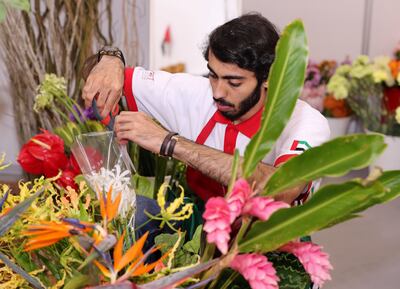Although many students beginning university this year will be taking traditional subjects, such as English or politics, a number will be enrolling on much more niche courses.
Around the world, a diverse array of unusual degree subjects are offered, ranging from baking science and technology at London South Bank University to professional floristry and floral design at University Centre Myerscough, also in the UK.
In the US, the University of New Hampshire offers a bachelor’s degree in ecograstronomy, covering the intersection of food and the environment, while the University of Connecticut runs a master’s degree in puppet arts.
Other degree courses include horology, the art of watches and clocks, and foresight, which should equip graduates with the skills to understand transformational change that may affect organisations.

Alan Bullock, who has a careers consultancy business and has given talks in UAE schools, said there was something to be said for “thinking outside the box” in subject choice.
“Looking for the sort of courses that other people may not be aware of and think seriously about may be a good policy,” he says.
Typically, he says, a minority of courses attract most applicants. So students who are prepared to consider rarer subjects may have better opportunities to pursue their interests.
A degree of caution is advised
Caution may be advisable, however, said Ann Starkie, who runs UK consultancy AS Careers.
“Probably with some degree areas … they come about because universities can get people to take them, but they won’t necessarily lead anywhere,” she says.
“Universities have diversified in order to appeal because they need to get students.”
While they are very niche, some unusual degrees, such as a foundation degree in surfing offered by Cornwall College in the UK, could open up careers in the area under study.
The college says the course makes students “well prepared for roles in the surfing field”, including careers in event management, surfing retail and environmental sustainability.
Consider if university is right path
Soraya Beheshti, regional director for the Middle East, Africa and Turkey at Crimson Education, a consultancy that assists students with college and university applications, said that in some niche fields it was unlikely that there were jobs available only to people with degrees in those subjects. They are not, she said, like medicine, where a degree is essential to practice as a doctor.
So if someone’s passion in life is surfing, and they want a career that relates to it, she suggested it might be worth considering whether going to university is the right choice.
“[But] if a student really knows their passion and they absolutely don’t want to do anything else and they love the idea of studying this for three or four years, why not?” she said.
“I think in the arts it can be particularly important, so specialising in something very, very niche, like a very niche visual arts technique, can definitely have value.

“And when I say the arts I take an expanded view to include computer science and Stem [science, technology, engineering and mathematics] as well.
“So, having a speciality in a very particular kind of 3D design or a very particular instrument of computer science actually [can] make you really, really in demand.”
Aside from niche subjects, students may also be deciding between taking a more traditional course, such as English or history, and a newer discipline like marketing, communications or media studies.
Ms Beheshti said there remained “a bias” towards older subjects, which are sometimes seen as more legitimate than modern counterparts.
“If you have an English degree vs a communications degree, there’s this perception it’s more traditional and established and maybe more acceptable,” she said.
“That could be because the older, more established universities don’t have degrees in media or communications, and newer universities that are not as well established will offer these [subjects].”
While the situation may vary from country to country, Mr Bullock said most employers who take on graduates were less concerned about the subject an applicant studied and more focused on the skills a person brings from his or her degree.
“That’s why your traditional subjects will still score highly,” he said. “It’s not the knowledge of history from your history degree that will make you employable, it’s the skills you gained from studying that subject.”
Five unusual degree courses:
Hand embroidery

This BA degree from the Royal School of Needlework in London is said to be the only one of its kind in Europe. It provides, the RSN says, “an academic learning experience which connects creative practice, textile and design theory with a technical skills base of hand embroidery”.
The RSN, which is based in Hampton Court Palace, a magnificent former royal residence, suggests that graduates may become designer-makers, freelance embroiderers for the fashion and interiors industries, or workshop facilitators in galleries and schools.
Surf science

This foundation degree in science from Cornwall College in south-west England is offered in one of the UK’s best surfing areas. However, actual surfing is not part of the course and the college says applicants do not need to be great surfers.
Aimed at people who are “passionate about surfing and want to pursue a career in the surf industry”, it includes a mix of demonstrations, workshops, lectures and more to explore subjects such as surf culture, surf practice and how geography influences surfing.
Horology

People looking for a career servicing and restoring clocks and watches may be interested in the BA in horology offered by Birmingham City University in the UK. As well as teaching the theory behind clocks and watches, the course examines how the industry is changing by teaching about new materials and designs, computer aided design and rapid prototyping. Between the second and third years, there is a professional placement year, where students work for an employer.
Foresight

The University of Houston in the US offers a Master of Science degree in foresight, which opens up careers in helping companies and clients anticipate change. Futurists, the university says, look at large-scale systemic or transformational change, rather than the incremental changes that traditional planners and forecasters have focused on. Subjects include retailing, consumer science and business and marketing.
Puppet Arts

This Bachelor of Fine Arts course from the University of Connecticut is aimed both at people with experience of puppetry and those who do not have a background in the field but “show signs of creativity, independent thinking and a passion for the arts”.
Students learn the many skills involved in puppetry, including storytelling, sculpting, writing and directing. Lighting, sound, costume and make-up are also included. Graduates, the university says, “perform and design for many theatres around the world”.





